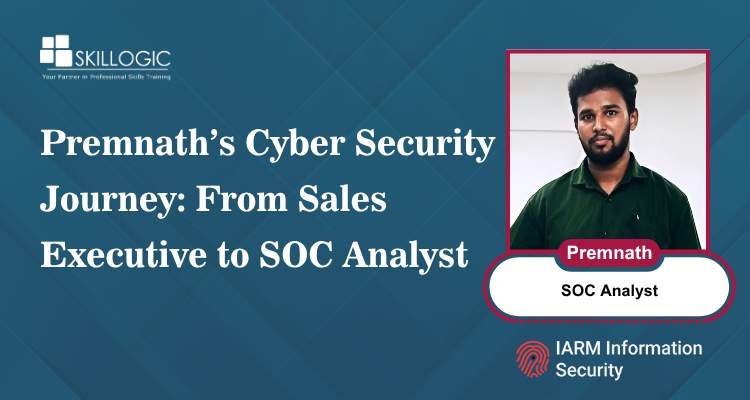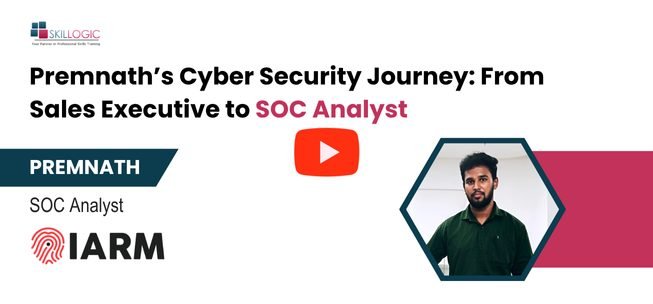Premnath’s Cyber Security Journey: From Sales Executive to SOC Analyst
Discover the inspiring career transition story of Premnath, an MBA graduate who pivoted from sales to cyber security and landed a SOC Analyst role. Learn how he did it, challenges he overcame, and tips for aspiring professionals.

Starting his career with an MBA in Marketing, Premnath worked as a Senior Executive in the jewelry industry. But a personal incident involving a ransomware attack on his brother’s phone sparked a deep interest in cyber security. With no prior background in IT or programming, transitioning from sales to a highly technical field wasn’t easy, but Premnath was determined to make it happen.
What helped him bridge that gap? SKILLOGIC’s beginner-friendly curriculum, hands-on training, expert mentorship, and dedicated placement support. Through consistent effort, continuous practice, and expert guidance, Premnath successfully landed a role as a SOC Analyst at VSecure Networks.
Here, we will explore Premnath’s inspiring journey from a sales executive to a SOC Analyst, his challenges, key turning points, and how SKILLOGIC’s structured training and placement support helped him make a successful career switch into cyber security.
Premnath’s Journey: Sales Executive to SOC Analyst
Let’s hear from Premnath himself as he shares how he made the bold leap from sales and marketing to cyber security, and how SKILLOGIC supported him throughout his transformative journey.
Q1: Can you tell us a little about your academic background and early career?
I completed my MBA in Marketing and did my internship as a Business Development Executive. I also worked as a Senior Executive in the jewelry industry before switching to cyber security.
Q2: What motivated you to switch from sales to cyber security?
I developed a growing interest in ethical hacking and cyber security while working in sales. The turning point came when my brother's phone was hacked via Telegram, leading to a ransomware attack that cost him money. That incident made me want to learn how to prevent such attacks, and that’s when I decided to pursue a career in cyber security.
Q3: Did you have any prior technical or programming background?
No. My undergraduate degree was a B.Sc. in Mathematics, and I had zero experience with programming or computer science.
Q4: How did you begin learning cyber security with no prior tech experience?
It was definitely a challenge. I had to start from the basics, even learning how computers function. But the course I joined was structured well and helped build my foundation. Learning from scratch made the process interesting and more rewarding.
Q5: What was your learning routine like during the training?
After my daily 2-hour classes, I’d commute for 1.5 to 2 hours to reach home. I’d then rest briefly and start revising what was taught. The next morning, I’d again review the previous day’s topics before attending class. I also enrolled in extra online courses from Google and IBM, and practiced on platforms like “Unhack Me.”
Q6: How supportive were the trainers during your learning journey?
Extremely supportive. My trainers, Fatima Ma'am and Abbas Sir, were available even late at night to resolve doubts. Their guidance was critical, both during and after class hours.
Q7: Did you work on any cyber security projects during your training?
Yes, I completed 3 projects. These were not just theory-based but practical, hands-on experiences. They were incredibly useful during interviews as I could speak confidently about real-world applications.
Q8: How many interviews did you attend before getting placed?
I attended 6 to 7 interviews. Each interview was different. For example, in one, the interviewer asked me to demonstrate a live attack that I had done in my project. Thanks to continuous practice, I was able to do it confidently.
Q9: Were all interviews similar in structure?
No, they varied depending on the company’s requirements. Some focused on basic cybersecurity concepts, others on SOC operations, and a few tested incident response knowledge.
Q10: Can you describe the interview where you finally got selected?
It lasted around 45 minutes. They asked about current cyber attacks, ransomware, malware types, and SOC procedures. I was also given a case study involving a financial institution hit by ransomware. I explained how I’d handle it step-by-step. That seemed to impress them.
Q11: Did mock interviews help you in preparing for the real ones?
Yes, I attended three mock interviews conducted by my trainers. I stumbled on a few questions, but used that as a learning opportunity. It boosted my confidence and performance in actual interviews.
Q12: Was your resume prepared with ATS in mind?
The company I joined didn’t use ATS since it’s a startup, but I was guided to create an ATS-friendly resume. The placement team helped me refine it after I completed my projects.
Q13: Did the placement team help you get the job?
Yes, the SKILLOGIC placement team, especially Karthika, helped a lot by coordinating with the HR and sharing preparation materials before interviews. Out of the 6 to 7 interviews I attended, 3 to 4 were arranged by SKILLOGIC and the rest I applied to on my own.
Q15: What advice would you give to someone from a non-technical background looking to switch to cyber security?
Interest is everything. You don’t need a tech background to succeed. If you’re truly interested and committed, you can learn anything. Stay consistent, keep practicing, and never stop learning.
Refer these articles:
- Bhuvan’s Path to Becoming a Cyber Security Expert
- Hari Charan’s Journey to Cyber Security Success
- Swathi's Cyber Security Journey from Mechanical Engineering
How Premnath Broke into Cyber Security: Key Insights
Here are the key insights from Premnath’s inspiring transition from sales executive to SOC Analyst, especially helpful for anyone from a non-technical background:
You Don’t Need a Tech Background to Start
Coming from marketing and a math degree, Premnath proves non-IT profiles can succeed in cyber security.
Structured Learning Makes the Difference
A beginner-friendly, well-structured course helped him build a solid foundation from scratch.
Discipline and Routine Matter
He followed a dedicated daily study routine, attending classes, revising lessons, and practicing regularly, which played a key role in his success.
Practice Over Theory
Hands-on tool practice made him confident during live interview demonstrations.
Trainer Support is Crucial
Trainers who were available even beyond class hours helped Premnath stay motivated and clarify doubts instantly, accelerating his learning process.
Projects Are Game-Changers in Interviews
His 3 real-world projects gave him strong content to showcase in interviews.
Mock Interviews Sharpen Real Performance
Attending mock interviews highlighted his weak areas, helping him improve before facing actual companies.
Placement Support Can Open Doors
SKILLOGIC’s placement team helped Premnath land multiple interview opportunities, with consistent guidance and preparation materials.
ATS-Friendly Resume Boosts Reach
Even though his company didn’t use ATS, he learned how to structure a job-ready, optimized resume for better visibility.
Refer these articles:
- How to Choose the Best Institute for Cyber Security in Bangalore
- How much is the Cyber Security Course Fees in Bangalore
- How to Become a Cyber Security Expert in Chennai
- Building a Cyber Security Career in Chennai: Key Skills, Salaries, and Tips
In short, Premnath’s journey shows that with the right mindset, structured training, and consistent effort, even professionals from non-technical backgrounds can build successful careers in cyber security. His story is a reminder that it’s never too late to make a bold switch, especially with the right support system like SKILLOGIC by your side.
Whether you're beginning your journey in cybersecurity or aiming to elevate your career, enrolling in an offline cyber security course in Bangalore can be a powerful move. As India's leading tech hub and home to a vast number of IT companies, startups, and global R&D centers, Bangalore offers unmatched opportunities in the cyber security domain. With access to top-tier professional training, industry events, and internship prospects, the city provides an ideal ecosystem to gain practical skills and build a successful career in cybersecurity.
SKILLOGIC stands out as one of India’s top institutes for cyber security training, offering high-quality, hands-on learning designed to industry needs. SKILLOGIC cyber security courses are designed to equip learners with practical skills and real-world expertise, making them industry-ready from day one. With instructor-led, offline cyber security course in Chennai and across major cities including Bangalore, Delhi, Pune, Hyderabad, Ahmedabad, Coimbatore, and Kochi, SKILLOGIC ensures accessible, job-ready education nationwide.
The SKILLOGIC’s Cyber Security Professional Plus program, powered by more than 100 expert trainers and accredited by NASSCOM FutureSkills and IIFIS, is designed to equip learners with practical skills in areas like ethical hacking, network defense, penetration testing, and cyber risk management. The course also includes 24/7 access to cloud labs, flexible learning formats, globally recognized certifications, and dedicated placement support.
More than 1 lakh professionals have been trained by SKILLOGIC, building successful, future-ready careers in cyber security makes SKILLOGIC as one of the best training institutes in India.


0
157